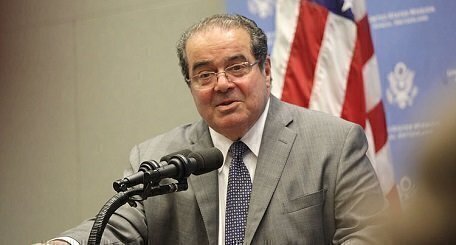Associate Justice Antonin Scalia’s unexpected death on Saturday sent shock waves through America’s legal and political system, with President Barack Obama saying he will nominate a replacement in due time.
 "I plan to fulfill my constitutional responsibilities to nominate a successor in due time," President Obama said in comments made to the nation on Saturday night. However, given that the GOP controls the Senate, which needs to confirm any nomination, the debate has started about the likelihood of any Justice being approved before a new President takes office in 2017.
"I plan to fulfill my constitutional responsibilities to nominate a successor in due time," President Obama said in comments made to the nation on Saturday night. However, given that the GOP controls the Senate, which needs to confirm any nomination, the debate has started about the likelihood of any Justice being approved before a new President takes office in 2017.
Scalia died in his sleep while on a trip to Texas at the age of 79. Chief Justice John Roberts issued a statement on the news of Justice Scalia's passing. "He was an extraordinary individual and jurist, admired and treasured by his colleagues," Roberts said. "His passing is a great loss to the court and the country he so loyally served. We extend our deepest condolences to his wife Maureen and his family."
For Roberts and the Supreme Court, Scalia’s death will complicate how an eight-person panel of Justices will settle pending decisions. Some of the Court’s biggest cases this term have yet to be heard, and others that have been heard could be affected by the absence of Scalia’s vote in any decision.
But another problem relates to how a new Justice is nominated to the Court and approved in a contentious election year. In the past, Justice Anthony Kennedy was approved unanimously in the 1988 election year, while Abe Fortas’s approval as Chief Justice failed in the election year of 1968.
The GOP currently has 54 votes in the 100-seat Senate, and any nomination this year would need Republican confirmation. Senate Judiciary Committee chair Chuck Grassley said on Saturday he hopes that the Senate will wait until after the presidential election to agree on Scalia’s replacement.
Senate Minority Leader Harry Reid said a delated confirmation would be a “shameful abdication of one of the Senate’s most essential constitutional responsibilities.”
But the failure to name a replacement in the next year could have broader implications.
Constitution Daily contributor Lyle Denniston, writing for SCOTUSblog, framed the issue in a column for that website.
“Today, the Court has at least four more months remaining in the Term. with most of the really controversial and high-stakes decisions still to come,” he said. “Whatever unfolds from here on, the Supreme Court will be a dominant topic of political conversation and lobbying warfare.”
Stephen Vladeck, a law professor at American University Washington College Law, told CNN that Scalia’s passing changes the course of the Court’s current term.
"The Court can try to go ahead, but on cases where they are split 4-4, their only options are to leave the lower court decision intact or to hold the case over until Justice Scalia's replacement is confirmed,” Vladeck said.
The Supreme Court returns from its current break for a conference on Friday, February 19 and starts hearing arguments on Monday, February 22.






